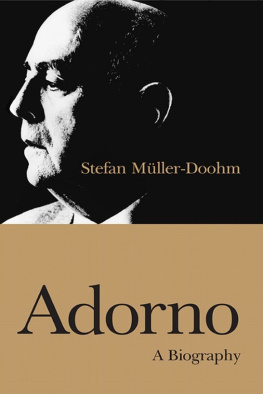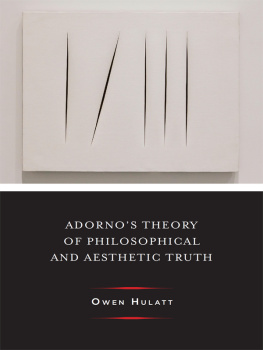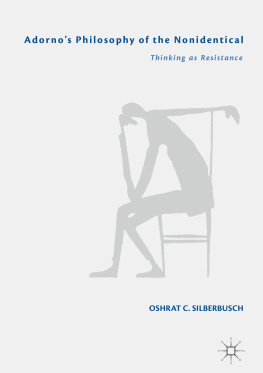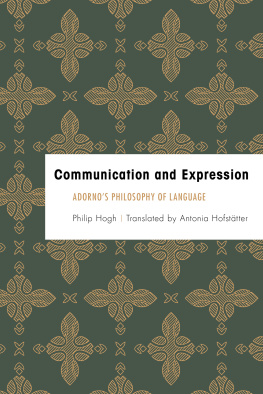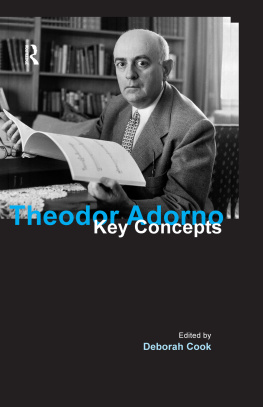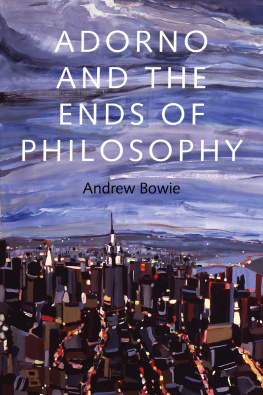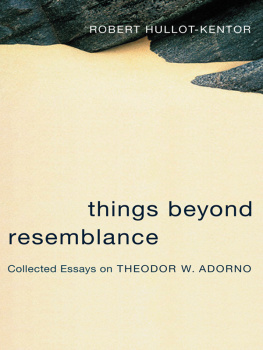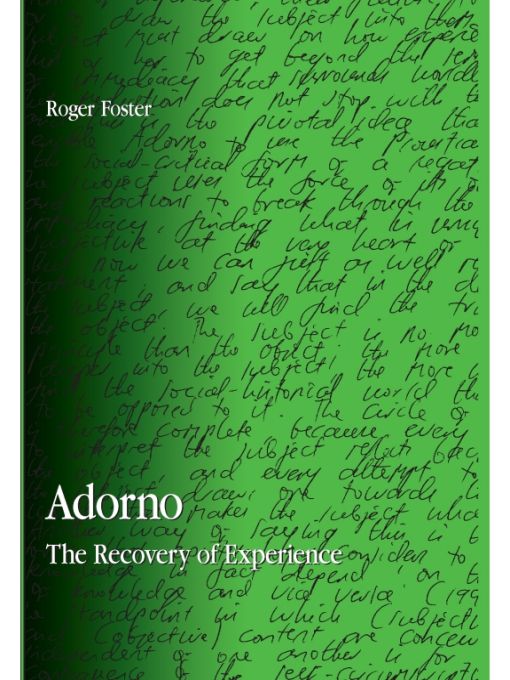
Table of Contents
SUNY series in Contemporary Continental Philosophy
Dennis J. Schmidt, editor
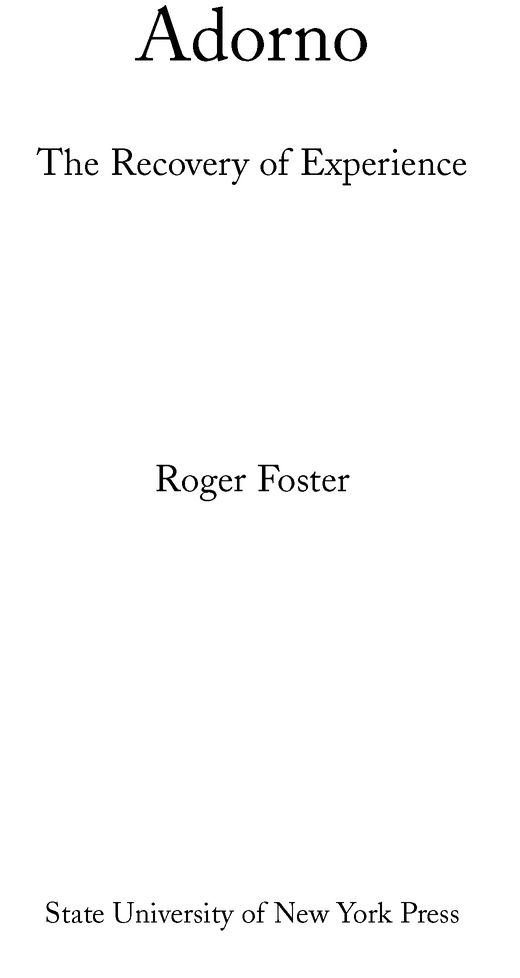
For Hildy
Acknowledgments
My engagement with Adorno began a decade ago under the auspices of Doug Moggach in the PhD program of the University of Ottawa. My ambition at the time was to rescue Adornos contribution to critical social theory from under the weight of its Habermasian critique. That project first crystallized during a stay at Frankfurt in 1997-1998 which, in large part because of Axel Honneths encouragement, proved to be an incomparable intellectual experience. This book began from a sense that the completion of that project did not really touch the core of what Adorno was all about. In trying to make sense of why that was so, I have benefited in the interim from conversations with Jay Bernstein, whose work on Adorno has been a continual point of intellectual reference. Brian OConnor and Tom Huhn have supported this project from the beginning. I hope it is a better work for their advice and encouragement. I couldnt have completed a project like this without an outlet from the wastes of Adornian abstraction. I am grateful in particular to two of my colleagues at BMCC, Matthew Ally and Jack Estes, for their disinclination to take Adorno too seriously. The professional insight of Ron Hayduk was also invaluable.
It would not have been possible to realize this work without the support of the Philosophy Committee of PSC-Cuny. Two Research Awards in 2004-2005 and 2005-2006 made it possible for me to do all the substantial writing in a reasonable space of time. Release Time won for junior faculty at the City University of New York by the Professional Staff Congress also proved to be vital in giving me breathing room to think and write.
This project began life around the same time as the birth of my son, Holden, three years ago. Its completion coincided (almost to the day) with the birth of my daughter, Eden. A number of people (Sue, Chuck, Lauren, and Mindy, and, in a cameo appearance, Alan and Rose) came through with babysitting assistance at just the right times to allow me to concentrate on Adorno. Finally, Hildy made this work possible in more ways than I know how to express. This book is dedicated to her.
NOTE ON TRANSLATION
All the translations from German and French original sources in this work are my own.
INTRODUCTION
The Theory of Spiritual Experience
The truths seized directly by the intelligence in the full light of the world
have something that is less profound, less necessary than those which life
has communicated to us in spite of ourselves, in an impression that is
material because it entered by way of the senses, but of which we can
discern the spirit. In sum... sensations must be interpreted as the signs of so
many laws and ideas, in order to think, or to draw out of the shadows what
I had experienced, to convert it in to a spiritual equivalent.
Marcel Proust, Time Regained
Literature ought only to depict a woman as bearing, as if she were a mirror, the colors of the tree or the river near which we typically represent her to ourselves.
Marcel Proust, The Guermantes Way
The gaze that in interpreting a phenomenon becomes aware of more than what it merely is, and solely thereby, of what it is, secularizes metaphysics.
Theodor Adorno,Negative Dialectic
The quotes from Proust above articulate both what is involved in the idea of spiritual experience, the interpretation of what strikes the senses as something that is at the same time spiritual, and also provide in miniature a depiction of the literary technique that is supposed to recover the idea of spiritual experience. The experiential item, Proust suggests, is to be read as a surface on which is inscribed a contextual whole, the immanent universal or essence of that item. The main idea behind the notion of spiritual experience can be understood as a type of interpretation that saturates the object with meanings derived from how it appears as significant or meaningful for a subject. The project of a recovery of spiritual experience, and the construction of a type of philosophical writing that would be able to put this in to practice, is the unifying core to Adornos strikingly multidisciplinary oeuvre. The introduction to Negative Dialectic, which perhaps more than any other of Adornos writings contains the methodological key to his work, had originally carried the title of a theory of spiritual experience. The introduction, Adorno writes, is intended to expound the concept of philosophical experience (1966, 10). Adornos understanding of dialectic must be seen in terms of this project. It was in the form of a highly original version of dialectic that Adorno found the solution to the philosophical recovery of spiritual experience. From the time of the 1931 Antrittsvorlesung, Adorno had sought to elucidate a type of reading in which particular items (whether philosophical concepts, musical pieces, artworks, social objects, etc.) would be interpreted as the locus of an immanent universal. Each particular thereby becomes a microcosm, where every element of that particular is a cipher that, when appropriately interpreted, can be made to reveal an aspect of that particulars spiritual significance. The reference to this type of experience as spiritual, geistig, is intended to distinguish it from the empiricist notion of experience. What is distinctive about spiritual experience is that the multilayered relations of a thing with other things outside it, and eventually the entirety of its context, are allowed to inform the cognitive significance of that thing. Rather than moving from the particular to the general by the abstraction of a common property from the object in question, spiritual experience moves from the particular to the universal by reweaving the threads of significance that link the object to its context. The universal is not brought to bear as a classification of the particular (where this implies the abstraction of a common property), it is rather constructed; the universal is simply the totality formed by the different chains of relational significance that make the object intelligible as the kind of object that it is. And these chains themselves are constructed by the interpretation of the elements that form the particulars surface. In the case of a philosophical text, the elements in question will be comprised of particular examples, turns of phrase, transition points of an argument, definitions, and elucidations. In the case of musical works, these elements will include phrases, melodic arrangements, and the technical structure. In sociological analysis, the elements will be present as the behaviors and characteristics of a thing, and the history of its interactions.
Whatever it is that is made the object of spiritual experience (and a guiding theme of Adornos thinking is that anything can potentially become such an object), the important thing is that this item is interpreted as the bearer of an immanent universal. Adorno developed this idea in opposition to the type of universal that figures in the classifying function of concepts. The classificatory operation of concepts is essentially the procedure that Kant (1974) describes as determinate judgment. Classification involves the subsumption of a particular under a pregiven concept, by treating that particular as an instance of a universal property. The particular is recognized (classified) as exhibiting an ideally detachable characteristic that it potentially shares with other things. Kant contrasts this structure with reflective or aesthetic judgment, in which judgment has to go in search of the concept, or perhaps even construct a new one, starting from the particular. The concept, in this case, is dependent on its object in a new and radical sense, because it emerges only through the interrogation of the material qualities of that particular object. This idea provides a useful frame for understanding the structure of spiritual experience. In spiritual experience, the particular is directly the
Next page


